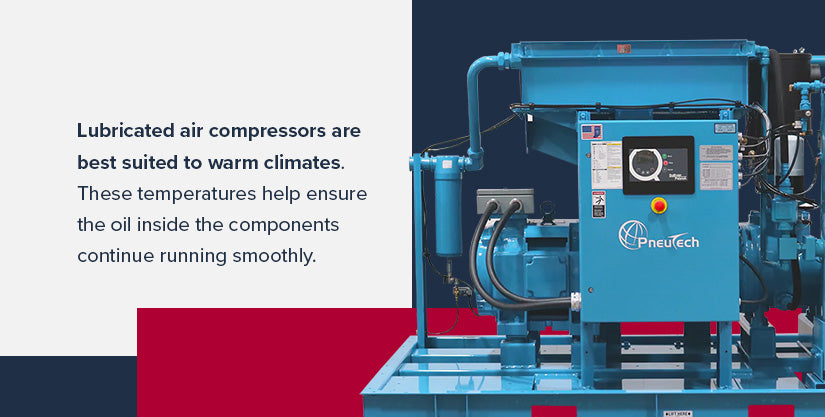Air compressors can revolutionize how your operations function, leading your business to get more work done at a higher level of quality. However, there are two primary types of air compressors on the market, and it can be challenging to determine which one you need.
If you're trying to decide between a lubricated or oil-free air compressor, we can help you determine which is best for your application. Below, you'll find information about these air compressors and the pros and cons of each.
In This Article
- What Is a Lubricated Air Compressor?
- What Is an Oil-Free Air Compressor?
- Oil vs. Oil-Free Air Compressors
- Pros and Cons of Oil-Free Air Compressors
- Are Oil-Free Air Compressors Better?
- Trust Fluid-Aire Dynamics as Your Air Compressor Resource
What Is a Lubricated Air Compressor?
Air compressors utilize a piston or rotary component that draws in air, which is compressed into a storage tank. Rotary elements and pistons need to move smoothly and consistently, which is why these parts generally require lubrication.
Lubricated air compressors, or oil-flooded air compressors, use oil to lubricate moving parts within the system. Lubricating oil is required for lubricated air compressors to ensure the piston or rotary element runs smoothly without damaging the equipment. The lubricating oil also helps maintain the efficiency of air compression and dissipates heat.
What Is an Oil-Free Air Compressor?
Unlike lubricated air compressors, oil-free air compressors utilize pre-lubricated materials, like Teflon, to coat their compression elements instead of oil. Some oil-free compressors may also use water instead of oil for the lubricating and cooling process. Even without oil, these materials pre-lubricated materials or water can help mechanisms move smoothly within the air compressor.
These air compressors also require rotors that have tight mechanical tolerances, which helps reduce friction between the components. Remembering that “oil-free” only refers to the compression chamber is essential. Lubrication may still be needed for parts outside the compression chamber and bearings.
Oil vs. Oil-Free Air Compressors
The differences between oilless and oiled air compressors are vast, even beyond the presence or absence of oil. Explore the advantages and disadvantages of oiled and oil-free air compressors in several key areas, from size to air quality.
Size
Oil-free compressors tend to be smaller than lubricated air compressors because they don't need additional room for oil. As a result, oil-free compressors also tend to be more portable. If you need an air compressor to move around your worksite, an oil-free option may be best suited to your applications.
Climate Requirements

Lubricated air compressors are best suited to warm climates. These temperatures help ensure the oil inside the components continue running smoothly. Alternatively, oil-free compressors are better suited to cooler climates, where lubricated air compressors can't perform at peak efficiency.
You may choose between one type of air compressor over the other if you're working in extreme temperatures.
Air Quality
Oil-free air compressors may be the better choice if you follow these strict guidelines because the air in lubricated air compressors can become contaminated by the oil. These air contamination concerns aren't relevant in all industries, but some must follow air quality guidelines, such as the food processing, electronics and pharmaceutical industries.
Noise Emissions
Noise emissions may be a significant consideration for your business, especially if noise can disrupt your operations. Lubricated air compressors typically make less noise because of the oil they use. If noise isn't a concern, you can choose between lubricated or oil-free air compressors, depending on the other requirements of your applications.
Energy Usage
Because lubricated air compressors need to move oil throughout the compression chamber and bearings, these machines tend to use more energy than oil-free air compressors. Oil-free compressors can help minimize your energy usage, which helps reduce your environmental impact and overall costs.
Environmental Impact
Lubricated air compressors have higher energy requirements and can increase the risk of oil contamination in some industries, making them less environmentally friendly than oil-free compressors. If your business has to meet specific environmental regulations, an oil-free compressor may be better suited to your applications.
Read More: Oil/Water Separators for Compressed Air Systems: Complete Guidelines
Pros and Cons of Oil-Free Air Compressors
Oil-free air compressors were created to reduce oil contamination in the air stream and the problems with oil carryover. The main advantage of oil-free air compressors is that they offer cleaner, drier air, which is essential in specific industries. However, oil-free compressors have some drawbacks to consider before deciding between the two options.
While oil-free air compressors don't use oil to keep their components lubricated, they still pose a risk of oil contamination. If any oils exist in the air, such as lubricants used in production or vaporized metalworking fluids, these oils can be absorbed by the air intake and end up in the compressed air supply. The only cases where oil-free air compressors can reduce oil carryover to zero is if the air supply is pristine. Otherwise, you'll need filters to prevent oil carryover and contamination.
Some other drawbacks of oil-free air compressors include the following:
- Costs: Oil-free air compressors can be more expensive than lubricated air compressors, sometimes even doubling the cost. A lubricated air compressor could be the most affordable option if you have limited capital and don't need to worry about oil carryover or contamination.
- Maintenance: Oil-free air compressors have higher maintenance costs than lubricated air compressors, especially if you use an oil-free compressor with rotary screws. These machines have fewer filters to change, but the compression screws in these air compressors are more likely to fail than those in a lubricated air compressor. If these compression screws fail, they can result in costly replacements or repairs. Additionally, compression screws in oil-free air compressors use two stages of compression rather than one, which can increase your repair costs if they fail. However, with professional maintenance and care, you can reduce the need for costly repairs.
- Service life: Lubricated air compressors have a longer service life than oil-free air compressors. The shorter life span means you'll have to replace your oil-free air compressor sooner, further increasing your costs. However, with the proper care, you can extend the service life of your equipment.
Despite these drawbacks, some industries should use oil-free air compressors over lubricated air compressors, such as those that need to reduce oil contamination as much as possible. However, using lubricated air compressors in sensitive industries is still possible when you utilize high-efficiency filtration.
Are Oil-Free Air Compressors Better?
The answer to whether oil-free air compressors are better than oiled air compressors depends on the needs of your applications. You'll want to consider different factors, including:
- Applications: How you plan to use air compressors is an essential factor when determining whether an oil-free compressor would be better suited to your needs. If you work in an industry that requires clean, dry air with little risk of contamination, you need an oil-free compressor. Choose a lubricated model in operations where oiled air isn't an issue or may even help your processes, choose a lubricated model.
- Uses: The next factor to consider is how often you need to use your air compressor. Oil-free air compressors are better suited to infrequent use, as they tend to have a shorter service life, while lubricated air compressors are best for frequent, heavy use.
- Budget: The last factor to consider is your budget. If you've just started using air compressors, you may want to start with a small oil-free model so you can get a better idea of how they work and how often you'll need to use one. If you choose this option, though, know you may spend more on repair and replacement costs down the line.
Trust Fluid-Aire Dynamics as Your Air Compressor Resource
Regardless of which type of air compressor you choose, Fluid-Aire Dynamics is here to help. We can help you transition from one type of air compressor to the next, depending on which is best suited to your applications.
Our team can help you find an air compressor that suits your needs, whether you need to reduce oil contamination or want an air compressor that can serve your business for as long as possible. We can also help you find a high-efficiency filter that helps reduce oil contamination and carryover in your business.
You can browse our complete collection of air compressors. To find out more or for a free estimate on air compressors for your business, contact us today.

